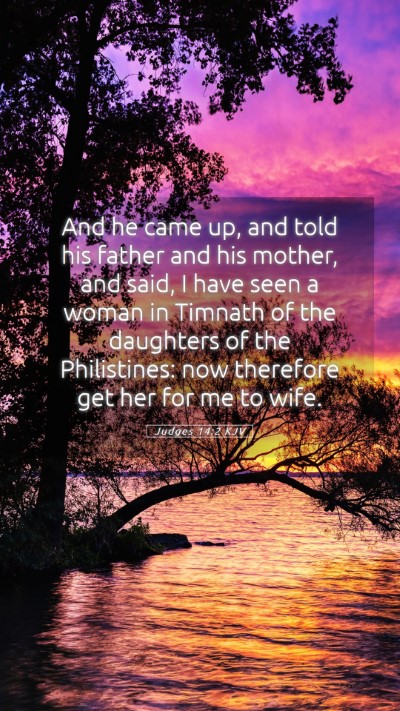Old Testament
Genesis Exodus Leviticus Numbers Deuteronomy Joshua Judges Ruth 1 Samuel 2 Samuel 1 Kings 2 Kings 1 Chronicles 2 Chronicles Ezra Nehemiah Esther Job Psalms Proverbs Ecclesiastes Song of Solomon Isaiah Jeremiah Lamentations Ezekiel Daniel Hosea Joel Amos Obadiah Jonah Micah Nahum Habakkuk Zephaniah Haggai Zechariah MalachiJudges 14:2 Meaning
What is the meaning of Judges 14:2?
And he came up, and told his father and his mother, and said, I have seen a woman in Timnath of the daughters of the Philistines: now therefore get her for me to wife.
Judges 14:2 Bible Verse Meaning
Understanding Judges 14:2
Overview: Judges 14:2 narrates an incident from the life of Samson, where he expresses his desire to marry a Philistine woman from Timnah. This verse opens with Samson seeing a woman and articulating his intention to marry her, which sets the stage for the divine and moral conflicts that follow.
This commentary integrates insights from renowned public domain scholars such as Matthew Henry, Albert Barnes, and Adam Clarke, providing a comprehensive understanding of the verse.
Bible Verse Meaning
In Judges 14:2, the verse states:
"And he came up, and told his father and his mother, and said, I have seen a woman in Timnath of the daughters of the Philistines: now therefore get her for me to wife."
Context and Background
Historical Context: The Book of Judges chronicles a tumultuous period in Israel's history when the nation was characterized by cycles of disobedience, oppression, and deliverance. During this time, the Israelites were often at odds with the Philistines, their primary enemies.
Samson’s desire to marry a Philistine woman reflects a departure from the covenantal expectations placed upon the Israelites to remain separate from surrounding nations.
Interpretation of the Verse
- Samson’s Choice: Matthew Henry notes that Samson’s choice to seek a wife among the Philistines demonstrates a disregard for the commands of God about intermarriage and religious purity (Exodus 34:16; Deuteronomy 7:3). This reflects a broader theme of the Israelites’ struggle against assimilation into foreign cultures.
- Parental Guidance: Albert Barnes comments on Samson informing his parents about his choice. While seeking approval, he demonstrates a lack of foresight regarding the implications of marrying outside the Israelite nation, highlighting the typical complexities in family dynamics regarding marriage.
- Divine Plan: Adam Clarke offers an insightful perspective on how God uses Samson’s flawed choices to bring about His purposes, indicating that even human mistakes can fulfill divine design (Romans 8:28).
Thematic Insights
The verse introduces several key themes:
- Cultural Conflict: The desire to marry a Philistine woman illustrates the tensions between Israel and its neighbors, which reflects broader spiritual battles.
- Divine Sovereignty: Samson’s disregard for his parents' counsel signals God's sovereign use of individuals, even in their disobedience, to achieve His plans for Israel's deliverance.
- Warning against Worldly Relationships: This narrative acts as a caution against forming unions that could compromise one's spiritual standing and lead to various conflicts, both personal and communal.
Cross References
- Exodus 34:16: A directive against intermarriage with foreign nations.
- Deuteronomy 7:3: God's instruction to the Israelites to not give their daughters to foreign sons.
- 1 Corinthians 15:33: The importance of not being misled, as bad company corrupts good character.
- Judges 16:1: Further instances of Samson's engagements with foreign women.
Application
This passage poses several poignant questions for individual reflection:
- In what ways do my choices reflect my values and beliefs?
- How can I ensure that my relationships align with my spiritual commitments?
- What does this verse teach us about God’s sovereignty over human choices?
Concluding Reflection
Judges 14:2 serves not only as a historical account but also as a profound teaching moment for contemporary believers. It challenges readers to consider the consequences of their choices and to remain steadfast in their faith amidst cultural pressures. Engaging in Bible study insights through online Bible study platforms or Bible study groups can enhance one's understanding of such passages, providing deeper insights into human behavior and divine providence.


